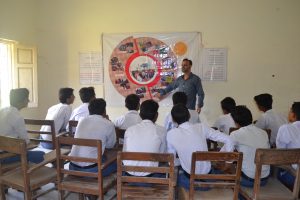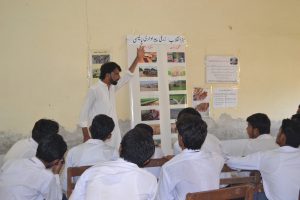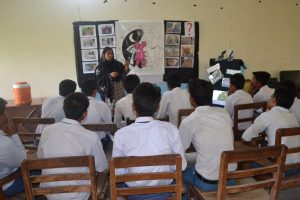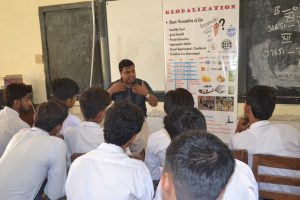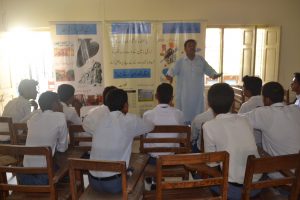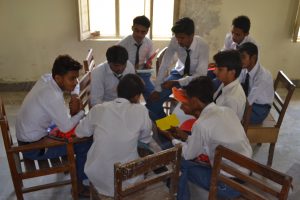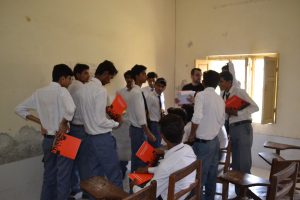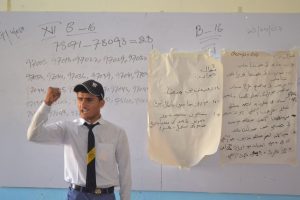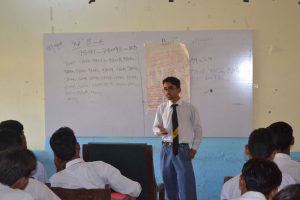District Level SPACE Program; GHOTKI
In Ghotki, Sindh under safe and nutritious food campaign a SPACE session was organized for PKMT youth and members to create awareness on various aspects of Pakistan’s political economy of agriculture and food. A total of 33 members participated including 16 females.
The participants went through the different modules based on Production and consumption, Globalization, Land grab and green revolution and patriarchy.
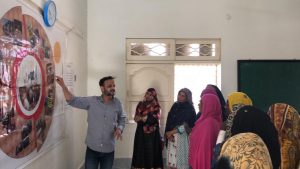 In the first exhibit ‘Sustainable Production and Consumption,’ participants are given information on the importance of equitable land distribution among small and landless farmers (especially women farmers). Secondly, the focus is on highlighting the importance of implementation of adequate nutritious food for all and the need to promote traditional agro-ecology based sustainable production system that yield healthy nutritious foods and reject chemical based industrial agricultural production system. Thirdly, the aim of the exhibit is to emphasize the critical need for realizing that small and landless farmers are the bulwarks on which our food and agriculture system is based. So the small and landless farmers must be given the prime space for all decision-making as well as implementation in food and agriculture policies while rejecting imperialist corporate agriculture policies.
In the first exhibit ‘Sustainable Production and Consumption,’ participants are given information on the importance of equitable land distribution among small and landless farmers (especially women farmers). Secondly, the focus is on highlighting the importance of implementation of adequate nutritious food for all and the need to promote traditional agro-ecology based sustainable production system that yield healthy nutritious foods and reject chemical based industrial agricultural production system. Thirdly, the aim of the exhibit is to emphasize the critical need for realizing that small and landless farmers are the bulwarks on which our food and agriculture system is based. So the small and landless farmers must be given the prime space for all decision-making as well as implementation in food and agriculture policies while rejecting imperialist corporate agriculture policies.
The second Exhibit was on ‘Green Revolution, It is an agriculture system which was introduced by United States in 1960s. It is based on intense use of high yielding variety seeds, chemical fertilizers and poisonous pesticides. The exhibit highlighted the extremely disastrous impacts of Green Revolution economically, socially and politically. It is economically disastrous because farmers have become market dependent on external inputs and have become more and more indebted. In addition mechanization has taken away livelihood from million of farmers (especially landless farmers) forcing rural to rural and rural to urban migration.
The third Exhibit ‘Patriarchy, informed the p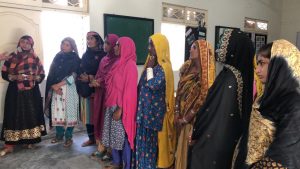 articipants about patriarchal system which controls the women socially, politically and economically. It reveals about the discrimination faced by girls and women in different fields of life. It highlights the roots of the issue and tried to find cooperative methods among boys and girls to dismantle patriarchy.
articipants about patriarchal system which controls the women socially, politically and economically. It reveals about the discrimination faced by girls and women in different fields of life. It highlights the roots of the issue and tried to find cooperative methods among boys and girls to dismantle patriarchy.
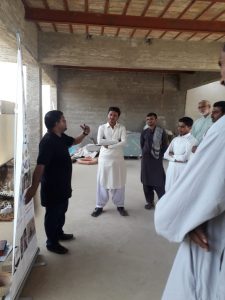 In the fourth Exhibit, Globalization: participants were given information on globalization. Firstly, the pre globalization era, the oil crisis of third world countries which lead to the Structural Adjustment Program (SAP) was discussed. The participants were also informed about three most often demanded reforms, deregulation, privatization and trade liberalization. Secondly, the impacts of globalization or neo liberalization and the negative role played by institutions like world trade organization and World Bank were also discussed. Finally, the most critical agreements like Agreement on Agriculture (AoA) and Trade related aspects of intellectual property rights (TRIPS) were also discussed.
In the fourth Exhibit, Globalization: participants were given information on globalization. Firstly, the pre globalization era, the oil crisis of third world countries which lead to the Structural Adjustment Program (SAP) was discussed. The participants were also informed about three most often demanded reforms, deregulation, privatization and trade liberalization. Secondly, the impacts of globalization or neo liberalization and the negative role played by institutions like world trade organization and World Bank were also discussed. Finally, the most critical agreements like Agreement on Agriculture (AoA) and Trade related aspects of intellectual property rights (TRIPS) were also discussed.
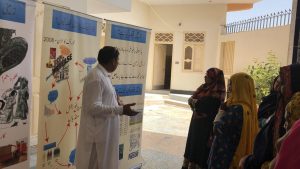 Finally the Exhibit of Land grab was displayed, It was informed that what is land grab, why it is effecting on food production and producers (small farmers). Firstly, Land grab actually benefits the feudal lords who give it on lease. On one hand they maintain property rights over land but as the same time earn huge amount through land rental and on the other hand that how land grabbing gives the corporate sector control on our land and lives. Secondly, The corporate agriculture is also promoting land grab as a lot of land is require, even if it is fossil fuel production or using technologies like wind or solar energy. It is therefore important to know that land eviction means loss of lives, livelihood, shelter and security.
Finally the Exhibit of Land grab was displayed, It was informed that what is land grab, why it is effecting on food production and producers (small farmers). Firstly, Land grab actually benefits the feudal lords who give it on lease. On one hand they maintain property rights over land but as the same time earn huge amount through land rental and on the other hand that how land grabbing gives the corporate sector control on our land and lives. Secondly, The corporate agriculture is also promoting land grab as a lot of land is require, even if it is fossil fuel production or using technologies like wind or solar energy. It is therefore important to know that land eviction means loss of lives, livelihood, shelter and security.
Govt Degree College Ghotki:
A SPACE session was conducted at Government Degree College Ghotki, for grade 11-12th students in context to a campaign on safe and nutritious food. The focus of the sessions was to introduce students to the political economy of agriculture and food. The total number of 59 students participated in the activity.
The students went through five different modules: (i) Production and Consumption, (ii) Green Revolution, (iii) Patriarchy, (iv) Land Grab and (v) Globalization. The process is that groups of 8-10 students are taken to each of the module in a particular order, spending 15-20 minutes at each exhibit and then as a group come to their own conclusion on what they were able to grasp from the ‘Walk through the Maize’.
In the first exhibit ‘Sustainable Production and Consumption,’ participants were given information on the importance of equitable land distribution among small and landless farmers (especially women farmers). Secondly, the focus was on highlighting the importance of implementation of adequate nutritious food for all and the need to promote traditional agro-ecology based sustainable production system that yield healthy nutritious foods and reject chemical based industrial agricultural production system. Thirdly, the aim of the exhibit was to emphasize the critical need for realizing that small and landless farmers are the bulwarks on which our food and agriculture system is based. Small and landless farmers must be given the prime space for decision-making and implementation in food and agriculture policies while rejecting imperialist corporate agriculture policies.
The second Exhibit was on ‘Green Revolution. It is an agriculture system which was introduced by United States in 1960s and is based on intense use of high yielding variety seeds, chemical fertilizers, mechanization and poisonous pesticides. The exhibit highlighted the extremely disastrous impacts of Green Revolution economically, socially and politically. It is economically disastrous because farmers have become market dependent on external inputs and have become more and more indebted. In addition mechanization has taken away livelihood from million of farmers (especially landless farmers) forcing rural to rural and rural to urban migration. Politically, it has skewed power to big landowners and marginalized small farmers. Finally socially and environmentally, Green Revolution has wrecked the environment; pesticides have almost eliminated many critical environmentally friendly insects such as the honey bee, earthworms and others, while polluting our soil, water and foods.
The third Exhibit ‘Patriarchy, informed the participants about patriarchal system which controls women socially, politically and economically. The module highlights the discrimination faced by girls and women in different fields of life, and aims to sensitize society toward dismantling patriarchy.
The fourth exhibit Globalization provided information on economic policies especially neoliberal economy. The module provided details of the pre globalization era mostly in the context of the set of policies known as Structural Adjustment Program (SAP). The participants were provided basic information on deregulation, privatization and trade liberalization as well as the institutions influential in developing these policies.
In the final exhibit, Land Grab discussion was on the phenomenon where foreign corporations and states are acquiring land in various countries for agricultural production. The issues emanating from such corporate-friendly policies were highlighted with emphasis on impacts on small and landless farmers. The benefits of land grabbing gained by elite politically strong actors were discussed. Land grab benefits the feudal lords who give their land on lease. They maintain property rights over land but at the same time earn huge profit through land rental. The corporate sector is able to control what is grown on the land, the price and market of the produce.
After the walk, the students were divided in five groups and provided their feedback in the form of groups’ presentations. The following is a summary of their presentations
Regarding farmers rights they point out that:
- Farmers work from day to night in the fields, without thinking about extreme hot or cold weather, they took care of the land as their children but in return
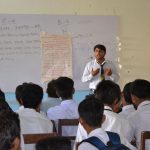 they cannot even feed their children and all the profit is taken by the feudal lords or capitalists.
they cannot even feed their children and all the profit is taken by the feudal lords or capitalists. - Farmers are not getting proper food and nutrition and they become so helpless that they decide to leave their villages and migrate towards cities or other villages.
- Farmers are also deprived from the basic needs like education, health facilities and livelihood.
Regarding women rights:
- Women are living their lives under the norms of patriarchal system. Their
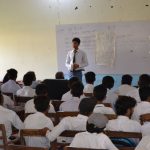 mobility, decisions and nutrition is controlled by men or other women who are more powerful than them.
mobility, decisions and nutrition is controlled by men or other women who are more powerful than them. - Female family members get less importance and not given equal opportunities and face exploitation and oppression.
- Women face violence from men whenever they talk about their rights.
Regarding corporate agriculture and Land Grab:
- The production of our country is going out of our hands and the corporate are
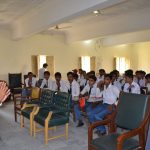 taking advantage from it.
taking advantage from it. - The land which should benefit the local farmers is occupied by capitalists and land grabbers.
- The foreign companies are planting their corporations and using our land for trade.
The students demanded from the government:
- Equal distribute the land, so that farmers can get there right of land.
- Women should be given equal rights as men.
- Stop corporate agriculture.
They concluded that we must use the products of our own country rather than using the products of other countries.

